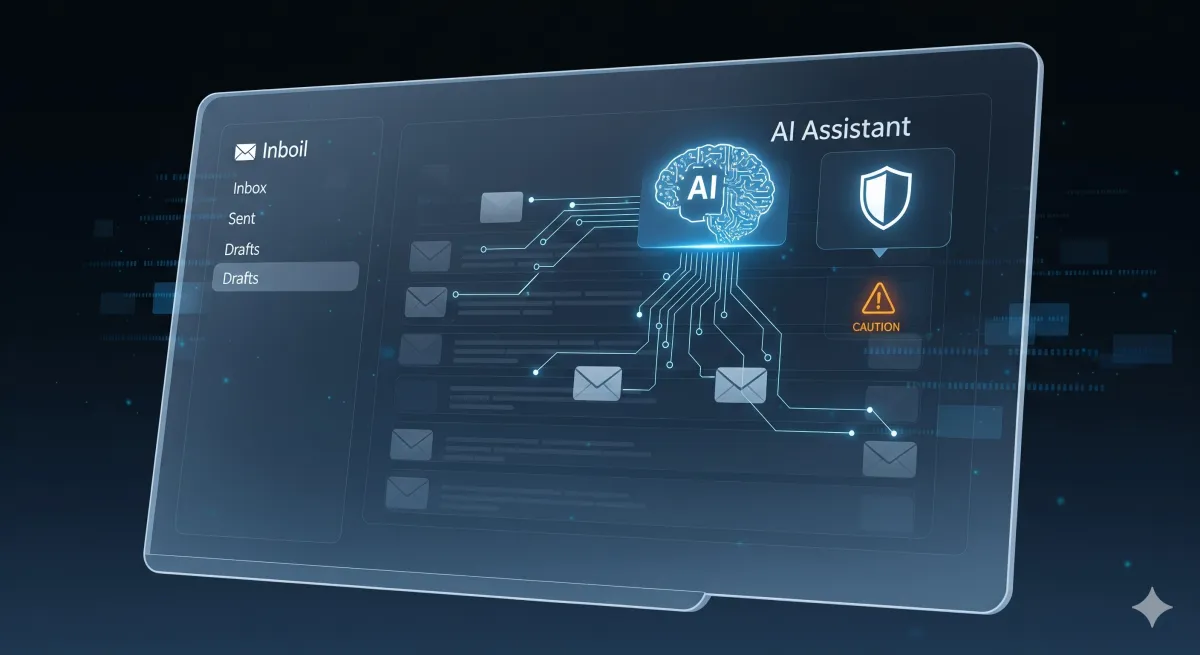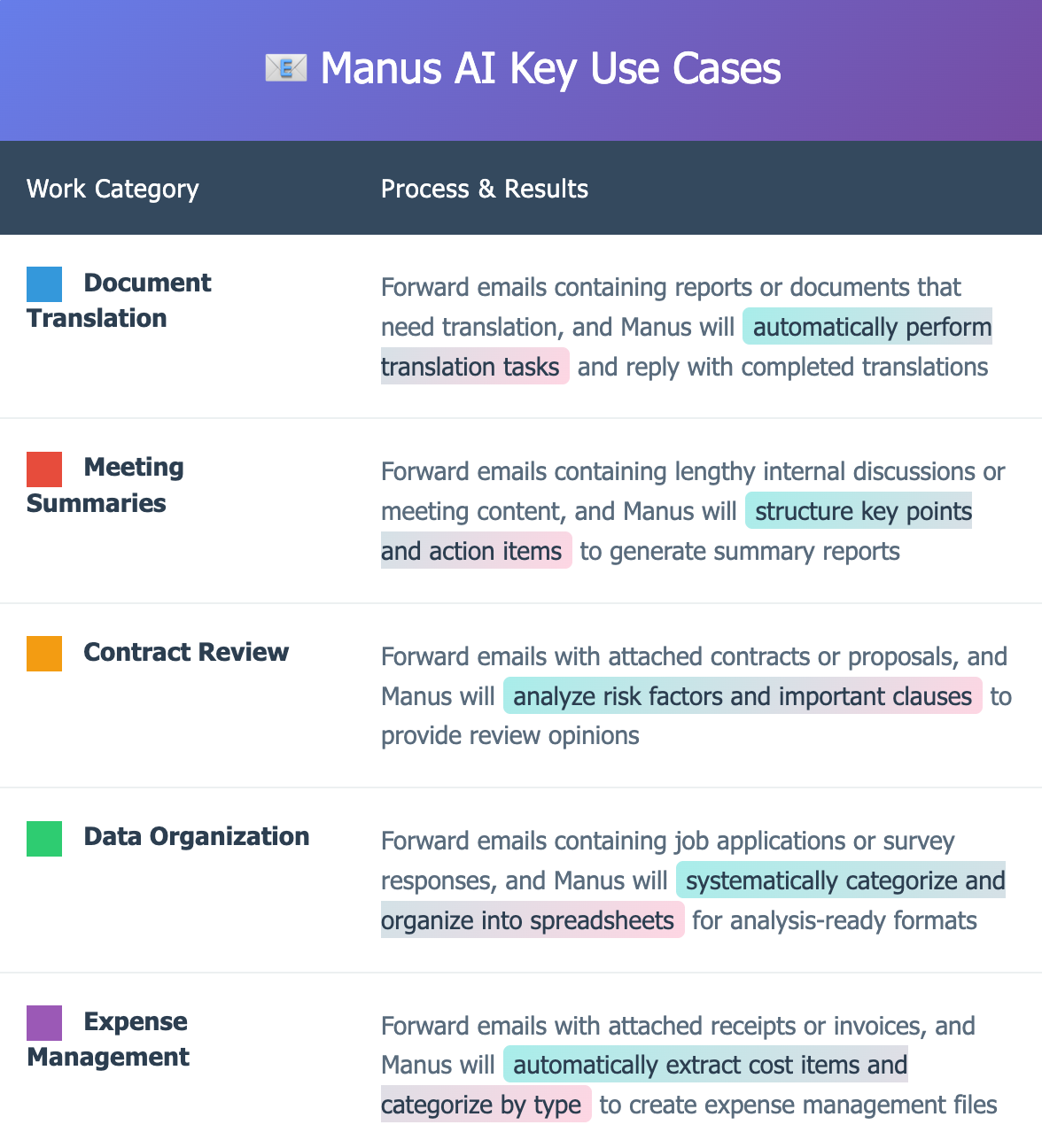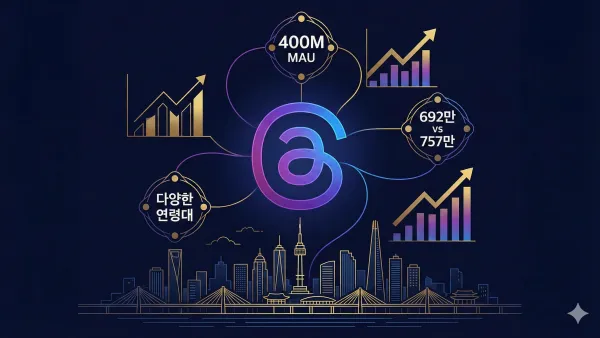Manus, Email-Based AI Task Automation Service Unveiled: Questions Behind the Convenience
AI can now handle tasks like translation, contract review, and data organization via email. But behind convenience lurk risks—loss of data control, dependency, and opaque processes. The question remains: can we embrace AI’s ease while staying critical and vigilant?

Manus recently unveiled Mail Manus, an email-based AI task processing feature. When a user forwards an email from Gmail, Outlook, etc., to @manus.bot, Manus recognizes it as a task, processes it, and sends back the results¹.
On the surface, it seems like a simple convenience feature, but this is the first full-fledged attempt by AI to occupy email, the most basic digital communication tool. And all occupation begins in the name of convenience.
Manus AI Overview and Differentiation
Manus is an autonomous AI agent developed by the Chinese startup Monica (formerly Butterfly Effect), launched on March 6, 2025. It utilizes a multi-model architecture, including Claude and Alibaba's Qwen, to independently plan and execute tasks²‚³.
The difference in approach is clear when compared to existing services like Google's Duet AI or Microsoft Copilot. While existing services are tools that work within email, Manus recognizes the email itself as a work instruction. This is not just a simple functional improvement, but a shift in interface philosophy.

The Dilemma of Convenience and Control
Manus's email-based approach is certainly attractive. You can access AI functions with a single, already familiar Forward button, without having to learn a new tool or design a complex workflow. But this convenience always comes at a price.
The first problem is data sovereignty. The moment you forward an email to Manus, all the content and attachments of that email go through the Manus server. Sending emails containing sensitive information such as contracts, financial information, and internal discussions to an external AI service essentially means relinquishing control over that information. From the perspective of GDPR or the Personal Information Protection Act, this becomes a black box situation where it is difficult to clearly define the purpose and scope of data processing.
The second is the trap of dependency. As users gain experience in solving complex tasks simply by forwarding emails, they tend to accept AI judgments without verification. Especially in areas that require professional judgment, such as contract analysis or financial review, this blind faith can lead to fatal errors⁴.
Rediscovery of Email
What's interesting is that Manus has reinvented the 1970s technology of email as the interface for AI in 2025. This is not just a technical choice, but a philosophical one. While modern communication tools like Slack, Teams, and Discord emphasize real-time and collaboration, email still holds the domain of formal communication.
Manus has utilized these characteristics of email—asynchronous, documented, and traceable—as key elements of AI work instructions. This elevates the interaction with AI from a one-time conversation to a work record. The fact that all AI work requests and results are stored in the mailbox and can be searched and tracked is an important advantage in a corporate environment.
You need to select an address to receive mail.
Warning Signs and Countermeasures
However, a few warning lights are on. Manus is currently experiencing system instability and server overload issues, and has been reported to have a higher failure rate than ChatGPT Deep Research⁵. These technical limitations can be fatal to business continuity.
A more fundamental problem is the black-boxing of work processes. The convenience of everything being solved by forwarding an email makes the detailed process of the work invisible. Whether it's translation or contract analysis, it's hard to know what judgment criteria the AI applied in the process and what information it missed.
Finding a Balance
That's not to say that the value of Manus should be denied. The key is how to use these tools. If approached with the concept of a first-pass review rather than full automation, it can greatly increase work efficiency in the areas of classifying and summarizing large amounts of information.
The important thing is to draw a line. It is necessary to have the wisdom to distinguish between simple information processing and areas that require professional judgment, and to classify and use sensitive information and general information. And above all, you must maintain the ability to verify the results of AI without blind faith.
Epilogue: The Price of Convenience
Manus has presented an interesting experiment in combining email and AI. But like all innovations, new risks lurk behind the convenience. These include data sovereignty issues, the opacity of work processes, and the potential for the degradation of professional judgment.
Ultimately, what matters is not the technology itself, but our attitude towards using it. If we can use tools like Manus while remaining critically-minded and maintaining our ability to verify, without being intoxicated by the convenience that AI creates, and by drawing appropriate boundaries, they will surely become valuable assistants.
References
- Medium - "Manus AI Dropped a Crazy Update" (2025)
- MIT Technology Review - "Everyone in AI is talking about Manus. We put it to the test" (2025)
- DataCamp - "Manus AI: Features, Architecture, Access, Early Issues & More" (2025)
- Geeky Gadgets - "How Manus AI Handles Coding, Data Science, and Email Tasks" (2025)
- MIT Technology Review - "Everyone in AI is talking about Manus. We put it to the test" (2025)
Q&A
Q: What is Manus's Mail Manus feature? A: It is a feature where if a user forwards an email from Gmail, Outlook, etc., to the @manus.bot address, Manus automatically analyzes and executes the task and sends back the results. Various tasks such as translation, document summarization, contract analysis, and data organization can be handled simply by forwarding an email.
Q: What is the difference from existing AI services? A: While Google Duet AI or Microsoft Copilot are auxiliary tools that work 'inside' mail, Manus is different in that it recognizes the 'mail itself' as a work instruction sheet. You can use AI functions directly from your existing email environment without a separate app or complicated settings.
Q: What are the risks of using Manus? A: There are three main risks. First, you can lose data sovereignty by sending emails containing sensitive information to an external server. Second, a dependency on accepting AI results without verification can be created. Third, there is a black box problem where it is impossible to know how the AI made its judgments.
Q: What are the current technical limitations of Manus? A: It has system instability and server overload problems, resulting in a higher failure rate than ChatGPT Deep Research. It also has difficulty processing large amounts of text and has issues with formatting being broken.




